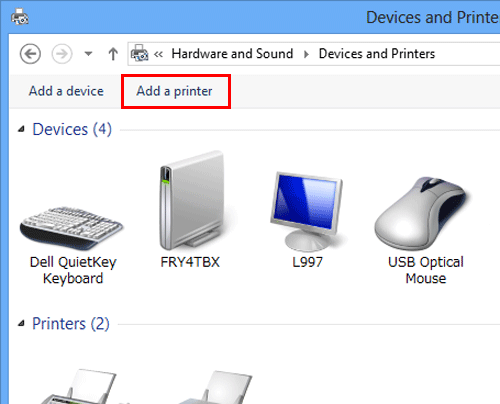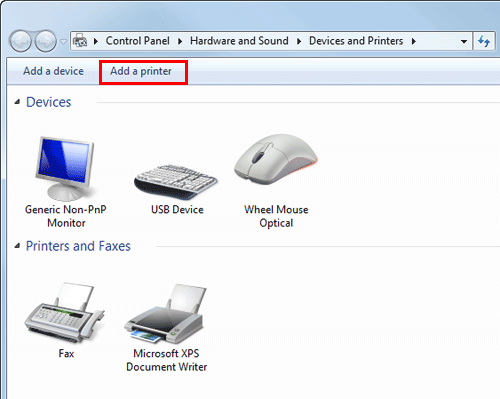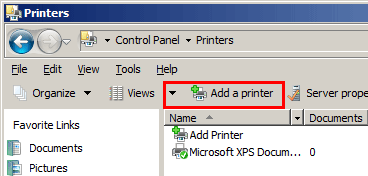Installation Using an IPP/IPPS Connection
Operations required to use this function (For administrators)
Configure the IPP/IPPS operating environment.
How to configure the setting is explained using Web Connection. For details, refer to [Configuring the IPP printing environment] .
In Windows 8.1/10/Server 2012/Server 2012 R2/Server 2016
 Administrator privileges are required to perform this task.
Administrator privileges are required to perform this task.
Insert the printer driver DVD into the DVD drive of the computer.
Display the printer window.
 In Windows 8.1/10, while pressing the [Windows] (
In Windows 8.1/10, while pressing the [Windows] ( ) key, press the [X] key, and then click [Control Panel] - [Hardware and Sound] - [View devices and printers] in the displayed menu.
) key, press the [X] key, and then click [Control Panel] - [Hardware and Sound] - [View devices and printers] in the displayed menu. In Windows Server 2012/Server 2012 R2/Server 2016, while pressing the [Windows] (
In Windows Server 2012/Server 2012 R2/Server 2016, while pressing the [Windows] ( ) key, press the [X] key, and then click [Control Panel] - [Hardware] - [View devices and printers] in the displayed menu.
) key, press the [X] key, and then click [Control Panel] - [Hardware] - [View devices and printers] in the displayed menu.Select Add a printer.

The [Add Printer] Wizard appears.
In the window showing the detected printer, click [The printer that I want isn't listed].
In [Select a shared printer by name], enter the URL for the machine in the following format, then click [Next].
 http://<IP address of this machine>/ipp
http://<IP address of this machine>/ipp
Example: http://192.168.1.20/ipp When specifying to use IPPS printing, enter "https://[host name].[domain name]/ipp".
When specifying to use IPPS printing, enter "https://[host name].[domain name]/ipp".
For [host name].[domain name], specify the host name and domain name registered for the DNS server being used. If the certificate for the machine is not the one issued by the certifying authority, you must register the certificate for the machine on the Windows 8.1/10/Server 2012/Server 2012 R2/Server 2016 system as the certificate by "Trusted Root Certification Authorities" for the computer account.
If the certificate for the machine is not the one issued by the certifying authority, you must register the certificate for the machine on the Windows 8.1/10/Server 2012/Server 2012 R2/Server 2016 system as the certificate by "Trusted Root Certification Authorities" for the computer account. When registering the certificate in the machine, check that the certificate shows [host name].[domain name] as the common name.
When registering the certificate in the machine, check that the certificate shows [host name].[domain name] as the common name.Click [Have Disk...].
Click [Browse...].
Select the folder on the DVD containing the desired printer driver, then click [Open].
 Select the folder according to the printer driver, operating system, and language to be used.
Select the folder according to the printer driver, operating system, and language to be used.
Selectable printer drivers: PCL driver, PS driver, and XPS driverClick [OK].
The [Printers] list appears.
Click [Next].
Follow the instructions on the pages that follow.
 If the [User Account Control] window appears, click [Continue] or [Yes].
If the [User Account Control] window appears, click [Continue] or [Yes].Click [Finish].
After finishing the installation, make sure that the icon for the installed printer is displayed in the [Devices and Printers] window.
Eject the DVD from the DVD drive.
This completes the installation process of the printer driver.
In Windows 7/Server 2008/Server 2008 R2
 Administrator privileges are required to perform this task.
Administrator privileges are required to perform this task.
Insert the printer driver DVD into the DVD drive of the computer.
Display the printer window.
 In Windows 7/Server 2008 R2, click the Start menu, then click [Devices and Printers].
In Windows 7/Server 2008 R2, click the Start menu, then click [Devices and Printers].
If [Devices and Printers] is not displayed, select [Control Panel] - [Hardware and Sound], and click [View devices and printers]. When [Control Panel] is displayed in an icon view, double-click [Devices and Printers]. In Windows Server 2008, click the Start menu, then click [Control Panel] - [Hardware and Sound] - [Printers]. When [Control Panel] is displayed in Classic View, double-click [Printers].
In Windows Server 2008, click the Start menu, then click [Control Panel] - [Hardware and Sound] - [Printers]. When [Control Panel] is displayed in Classic View, double-click [Printers].Select Add a printer.
 In Windows 7/Server 2008 R2, click [Add a printer].
In Windows 7/Server 2008 R2, click [Add a printer].
 In Windows Server 2008, click [Add a printer].
In Windows Server 2008, click [Add a printer].
The [Add Printer] Wizard appears.
Click [Add a network, wireless or Bluetooth printer].
Connected printers are detected.
In the window showing the detected printer, click [The printer that I want isn't listed].
In [Select a shared printer by name], enter the URL for the machine in the following format, then click [Next].
 http://<IP address of this machine>/ipp
http://<IP address of this machine>/ipp
Example: http://192.168.1.20/ipp When specifying to use IPPS printing, enter "https://[host name].[domain name]/ipp".
When specifying to use IPPS printing, enter "https://[host name].[domain name]/ipp".
For [host name].[domain name], specify the host name and domain name registered for the DNS server being used. If the certificate for the machine is not the one issued by the certifying authority, you must register the certificate for the machine on the Windows 7/Server 2008/Server 2008 R2 system as the certificate by "Trusted Root Certification Authorities" for the computer account.
If the certificate for the machine is not the one issued by the certifying authority, you must register the certificate for the machine on the Windows 7/Server 2008/Server 2008 R2 system as the certificate by "Trusted Root Certification Authorities" for the computer account. When registering the certificate in the machine, check that the certificate shows [host name].[domain name] as the common name.
When registering the certificate in the machine, check that the certificate shows [host name].[domain name] as the common name.Click [Have Disk...].
Click [Browse...].
Select the folder on the DVD containing the desired printer driver, then click [Open].
 Select the folder according to the printer driver, operating system, and language to be used.
Select the folder according to the printer driver, operating system, and language to be used.
Selectable printer drivers: PCL driver, PS driver, and XPS driverClick [OK].
The [Printers] list appears.
Click [OK].
Follow the instructions on the pages that follow.
 If the [User Account Control] window appears, click [Continue] or [Yes].
If the [User Account Control] window appears, click [Continue] or [Yes].Click [Finish].
After finishing the installation, make sure that the icon for the installed printer is displayed in the [Printers] or [Devices and Printers] window.
Eject the DVD from the DVD drive.
This completes the installation process of the printer driver. Once the settings for the printer have been configured, you can use the printer in the same way as a general local printer.